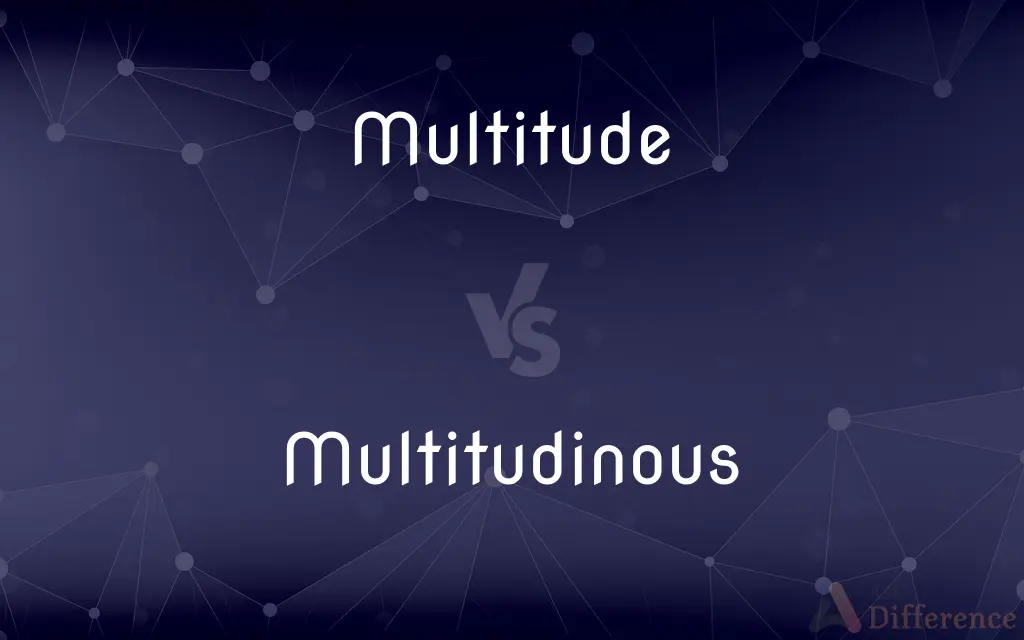Multitude vs. Multitudinous — What's the Difference?
Edited by Tayyaba Rehman — By Maham Liaqat — Updated on April 9, 2024
"Multitude" is a noun referring to a large number of people or things, while "multitudinous" is an adjective describing something as very numerous or involving a multitude.

Difference Between Multitude and Multitudinous
Table of Contents
ADVERTISEMENT
Key Differences
"Multitude" encapsulates the concept of a large group, whether it be people, objects, or ideas, highlighting the sheer volume or quantity within a collective. On the other hand, "multitudinous" applies this concept of vastness or abundance to describe the characteristics of something, indicating its composition from many elements or its vast number.
In usage, "multitude" serves to quantify or identify the scale of a group or collection directly. For example, one might refer to a "multitude of stars in the sky" to denote the vast number of stars visible. Conversely, "multitudinous" modifies subjects to attribute them with the quality of being numerous, such as in "multitudinous challenges," which suggests a wide array of challenges.
While both terms convey the idea of abundance, their grammatical roles differ significantly. "Multitude" functions as a substantive element within a sentence, capable of acting as the subject or object. In contrast, "multitudinous" provides descriptive detail, modifying nouns to enhance their meaning by conveying a sense of numerousness.
The distinction also extends to their usage in sentences. "A multitude" can stand alone as a noun phrase, often followed by a prepositional phrase starting with "of" to specify what the multitude comprises. "Multitudinous," however, must precede a noun, lending an attribute of abundance to that noun without needing further specification by a prepositional phrase.
Comparison Chart
Part of Speech
Noun
Adjective
ADVERTISEMENT
Definition
A large number of people or things
Describing something as very numerous
Usage
Quantifies or identifies the scale of a group
Modifies subjects to attribute them with numerousness
Example
"A multitude of opportunities"
"Multitudinous stars"
Role in Sentence
Can act as the subject or object
Provides descriptive detail, modifies nouns
Compare with Definitions
Multitude
Refers to a large number of entities.
The multitude gathered in the square was impressive.
Multitudinous
Indicates a vast number or quantity.
She marveled at the multitudinous lights of the city.
Multitude
Can apply to people, objects, or ideas.
He faced a multitude of choices.
Multitudinous
Directly precedes a noun without needing "of."
The poet spoke of the sea's multitudinous moods.
Multitude
Helps quantify or identify the scale.
A multitude of problems arose during the project.
Multitudinous
Describes something as having many parts or elements.
The multitudinous voices of the crowd blended into a single roar.
Multitude
Often used with a prepositional phrase starting with "of."
A multitude of stars filled the night sky.
Multitudinous
Used to modify and describe nouns.
They navigated through multitudinous challenges.
Multitude
Implies a large, often indeterminate, quantity.
The charity received a multitude of donations.
Multitudinous
Enhances meaning by conveying numerousness.
His achievements were as multitudinous as they were impressive.
Multitude
Multitude is a term for a group of people who cannot be classed under any other distinct category, except for their shared fact of existence. Though its use dates back to antiquity, the term first entered into the lexicon of political philosophy when it was used by figures like Machiavelli, Hobbes, and most notably, Spinoza.
Multitudinous
Very numerous; existing in great numbers.
Multitude
A very great number.
Multitudinous
Consisting of many parts.
Multitude
The masses; the populace
The concerns of the multitude.
Multitudinous
Populous; crowded.
Multitude
A great amount or number, often of people; abundance, myriad, profusion.
Multitudinous
Existing in great numbers; innumerable.
Multitude
The mass of ordinary people; the masses, the populace.
Pilate, wishing to please the multitude, released Barabbas to them.
Multitudinous
Comprising a large number of parts.
Multitude
A great number of persons collected together; a numerous collection of persons; a crowd; an assembly.
But when he saw the multitudes, he was moved with compassion on them.
Multitudinous
Crowded with many people.
Multitude
A great number of persons or things, regarded collectively; as, the book will be read by a multitude of people; the multitude of stars; a multitude of cares.
It is a fault in a multitude of preachers, that they utterly neglect method in their harangues.
A multitude of flowersAs countless as the stars on high.
Multitudinous
Coming from or produced by a large number of beings or objects.
Multitude
The state of being many; numerousness.
They came as grasshoppers for multitude.
Multitudinous
(obsolete) Of or relating to the multitude, of the common people.
Multitude
A large indefinite number;
A battalion of ants
A multitude of TV antennas
A plurality of religions
Multitudinous
Consisting of a multitude; manifold in number or condition; as, multitudinous waves.
A renewed jingling of multitudinous chains.
Multitude
A large gathering of people
Multitudinous
Of or pertaining to a multitude.
Multitude
The common people generally;
Separate the warriors from the mass
Power to the people
Multitudinous
Too numerous to be counted;
Incalculable riches
Countless hours
An infinite number of reasons
Innumerable difficulties
The multitudinous seas
Myriad stars
Untold thousands
Common Curiosities
Can 'multitudinous' stand alone in a sentence?
No, "multitudinous" must modify a noun and cannot stand alone.
What is the difference between 'multitude' and 'multitudinous'?
"Multitude" is a noun referring to a large group, while "multitudinous" is an adjective describing something as very numerous.
How does 'multitudinous' modify a noun?
"Multitudinous" precedes and modifies nouns to attribute them with the quality of numerousness.
Is 'multitude' always used with 'of'?
"Multitude" is often followed by "of" to specify what the large number comprises, but it's not an absolute rule.
Can 'multitude' apply to people only?
No, "multitude" can refer to a large number of any entities, including people, objects, or ideas.
How do 'multitude' and 'multitudinous' convey the idea of abundance?
"Multitude" identifies a large group directly, while "multitudinous" describes the numerous characteristics of something.
How does the context of use differ for 'multitude' and 'multitudinous'?
"Multitude" is used to directly quantify or identify a group, whereas "multitudinous" describes the attribute of being numerous for various subjects.
Is 'multitudinous' always related to physical quantities?
No, "multitudinous" can describe both physical quantities and abstract concepts like emotions or challenges.
What is an example of 'multitude' used in a sentence?
"The conference attracted a multitude of experts."
Can 'multitude' be used to describe concepts?
Yes, "multitude" can refer to a large number of abstract concepts, like ideas or choices.
Give an example of 'multitudinous' modifying a noun.
"The night sky revealed its multitudinous stars."
What makes 'multitudinous' distinctive in usage?
Its role as an adjective allows it to directly modify nouns, providing a descriptive quality of numerousness without needing a prepositional phrase.
How does 'multitude' function grammatically?
"Multitude" can act as the subject or object in a sentence, depending on its position and usage.
Can 'multitude' imply an indeterminate quantity?
Yes, "multitude" often implies a large, sometimes indeterminate, quantity of something.
Why is 'multitudinous' not used with 'of'?
"Multitudinous" directly modifies a noun, attributing numerousness without the need for further specification by a prepositional phrase.
Share Your Discovery

Previous Comparison
Talent vs. Gift
Next Comparison
Decimal vs. DenaryAuthor Spotlight
Written by
Maham LiaqatEdited by
Tayyaba RehmanTayyaba Rehman is a distinguished writer, currently serving as a primary contributor to askdifference.com. As a researcher in semantics and etymology, Tayyaba's passion for the complexity of languages and their distinctions has found a perfect home on the platform. Tayyaba delves into the intricacies of language, distinguishing between commonly confused words and phrases, thereby providing clarity for readers worldwide.















































